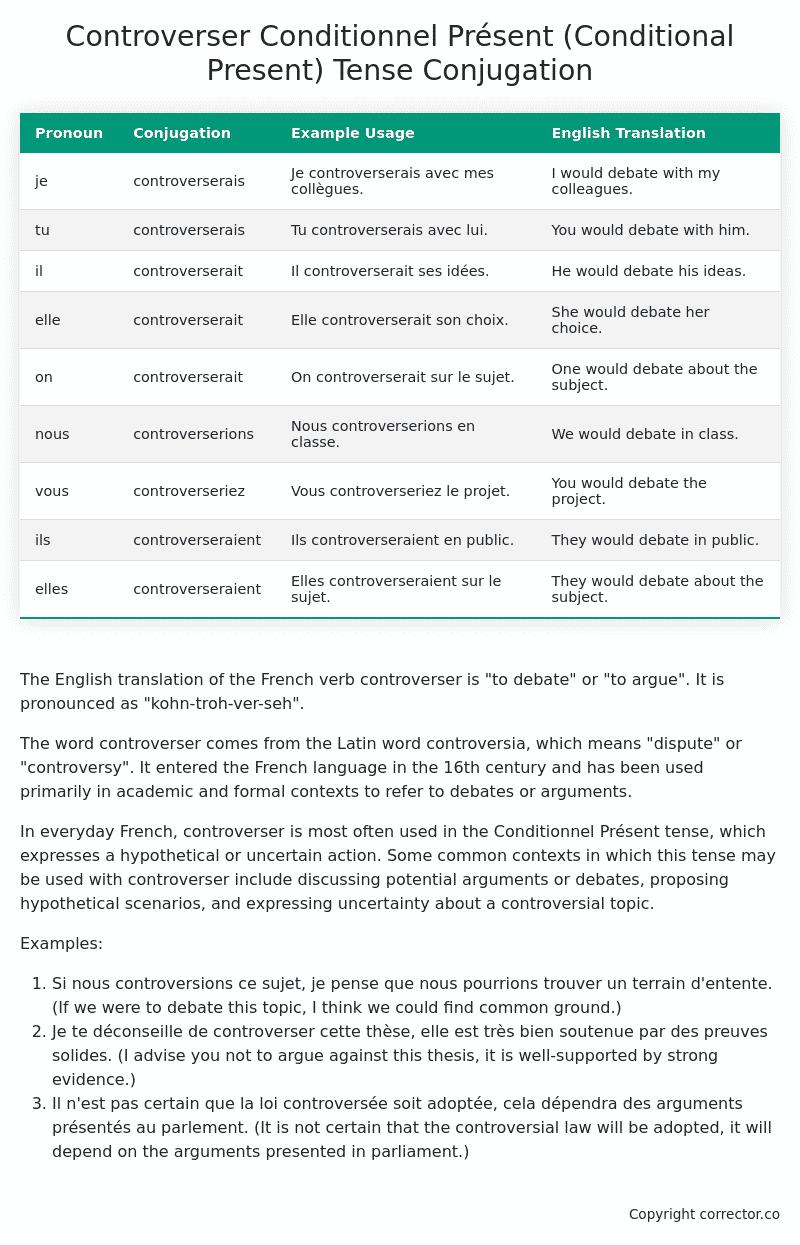Conditionnel Présent (Conditional Present) Tense Conjugation of the French Verb controverser
Introduction to the verb controverser
The English translation of the French verb controverser is “to debate” or “to argue”. It is pronounced as “kohn-troh-ver-seh”.
The word controverser comes from the Latin word controversia, which means “dispute” or “controversy”. It entered the French language in the 16th century and has been used primarily in academic and formal contexts to refer to debates or arguments.
In everyday French, controverser is most often used in the Conditionnel Présent tense, which expresses a hypothetical or uncertain action. Some common contexts in which this tense may be used with controverser include discussing potential arguments or debates, proposing hypothetical scenarios, and expressing uncertainty about a controversial topic.
Examples:
- Si nous controversions ce sujet, je pense que nous pourrions trouver un terrain d’entente. (If we were to debate this topic, I think we could find common ground.)
- Je te déconseille de controverser cette thèse, elle est très bien soutenue par des preuves solides. (I advise you not to argue against this thesis, it is well-supported by strong evidence.)
- Il n’est pas certain que la loi controversée soit adoptée, cela dépendra des arguments présentés au parlement. (It is not certain that the controversial law will be adopted, it will depend on the arguments presented in parliament.)
Table of the Conditionnel Présent (Conditional Present) Tense Conjugation of controverser
| Pronoun | Conjugation | Example Usage | English Translation |
|---|---|---|---|
| je | controverserais | Je controverserais avec mes collègues. | I would debate with my colleagues. |
| tu | controverserais | Tu controverserais avec lui. | You would debate with him. |
| il | controverserait | Il controverserait ses idées. | He would debate his ideas. |
| elle | controverserait | Elle controverserait son choix. | She would debate her choice. |
| on | controverserait | On controverserait sur le sujet. | One would debate about the subject. |
| nous | controverserions | Nous controverserions en classe. | We would debate in class. |
| vous | controverseriez | Vous controverseriez le projet. | You would debate the project. |
| ils | controverseraient | Ils controverseraient en public. | They would debate in public. |
| elles | controverseraient | Elles controverseraient sur le sujet. | They would debate about the subject. |
Other Conjugations for Controverser.
Le Present (Present Tense) Conjugation of the French Verb controverser
Imparfait (Imperfect) Tense Conjugation of the French Verb controverser
Passé Simple (Simple Past) Tense Conjugation of the French Verb controverser
Passé Composé (Present Perfect) Tense Conjugation of the French Verb controverser
Futur Simple (Simple Future) Tense Conjugation of the French Verb controverser
Futur Proche (Near Future) Tense Conjugation of the French Verb controverser
Plus-que-parfait (Pluperfect) Tense Conjugation of the French Verb controverser
Passé Antérieur (Past Anterior) Tense Conjugation of the French Verb controverser
Futur Antérieur (Future Anterior) Tense Conjugation of the French Verb controverser
Subjonctif Présent (Subjunctive Present) Tense Conjugation of the French Verb controverser
Subjonctif Passé (Subjunctive Past) Tense Conjugation of the French Verb controverser
Subjonctif Imparfait (Subjunctive Imperfect) Tense Conjugation of the French Verb controverser
Conditionnel Présent (Conditional Present) Tense Conjugation of the French Verb controverser (this article)
Conditionnel Passé (Conditional Past) Tense Conjugation of the French Verb controverser
L’impératif Présent (Imperative Present) Tense Conjugation of the French Verb controverser
L’infinitif Présent (Infinitive Present) Tense Conjugation of the French Verb controverser
Struggling with French verbs or the language in general? Why not use our free French Grammar Checker – no registration required!
Get a FREE Download Study Sheet of this Conjugation 🔥
Simply right click the image below, click “save image” and get your free reference for the controverser Conditionnel Présent tense conjugation!

Controverser – About the French Conditionnel Présent (Conditional Present) Tense
Formation
Common Everyday Usage Patterns
Expressing Polite Requests
Expressing Hypothetical Situations
Expressing Doubt or Uncertainty
Interactions with Other Tenses
Present Tense
Past Tense
Future Tense
Conditional Perfect
Summary
Want More?
I hope you enjoyed this article on the verb controverser. Still in a learning mood? Check out another TOTALLY random French verb conjugation!


